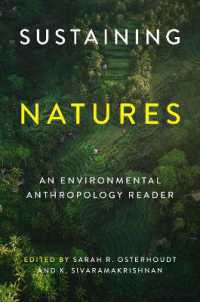- ホーム
- > 洋書
- > 英文書
- > Business / Economics
Full Description
This book contains an Open Access Chapter.
The UN estimates that there are approximately 476 million indigenous people around the world, and there are 1.8 million Native Americans in the USA. These individuals face recurring challenges with high rates of unemployment, poverty, unequal access to health care, low educational levels, and housing and food insecurity. They also face cultural dominance by one or more European countries, the confiscation of indigenous lands, environmental degradation, racism, higher suicide rates, shorter longevity rates, and countless indignities.
Another one of the biggest challenges facing Native Americans and indigenous people is that they often experience unfair discrimination in the employment process and exclusion from work organizations, which perpetuates their high rates of poverty. Despite these problems, there has been little or no research on Native American work issues in human resource management or related fields. Native American and Indigenous Peoples' World of Work aims to fill these research gaps. It considers the factors that affect unfair discrimination, racism, and the exclusion of indigenous people in work organizations; highlights the benefits of including indigenous people in organizations; develops a better understanding of indigenous people's work values, job choices, and reward preferences so organizations can attract and retain them; and offers directions for future research and practice on the plight of indigenous people in organizations. Along with The Dignity of Native Americans and Indigenous Peoples' Experiences at Work these volumes are unique in being the first titles on Native American or indigenous work issues, and many authors are indigenous people.
Contents
Chapter 1. Understanding Native American and Indigenous Peoples' Work Values and Reward Preferences; Dianna L. Stone, Brian Murray, and Kimberly M. Lukaszewski
Chapter 2. Indigenous Work Across the Employment Cycle: A Content Analysis of the Empirical Literature; Adam T. Murry, Sanchita Sharma, Elaine Atay, Melanie Grier, Alvan Yuan, and Alicia C. Brozny OPEN ACCESS
Chapter 3. Harnessing Native American Talent and Facilitating Their Contributions to Our Society; Stephanie Black and Deanna M. Kennedy
Chapter 4. Leadership Development from Indigenous Perspectives; Jamie A. Gruman, Shelley Price, Houston Barnaby, and Corey Mattie
Chapter 5. Self and Other Focused Pathways to Meaningfulness in Native American Workers; Amanda B. Stephens, Lori Anderson Snyder, Cooper S. Delafield, Raechel Sanger, Natalie Youngbull, and Yomna Helmy
Chapter 6. Cultural and Psychological Safety for Indigenous Employees; Catherine T. Kwantes, Alisha Jacobs, and M. Myriah MacIntyre






